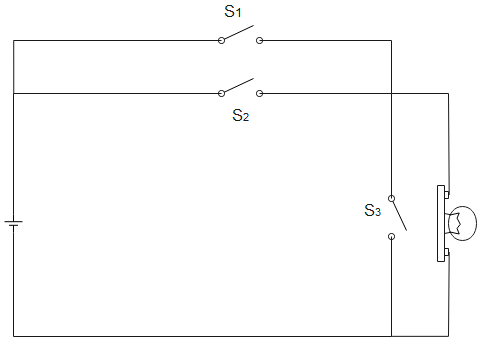
Consider the circuit below. The bulb will light up if:
A. ${S_1}$ ${S_2}$ and ${S_3}$ are all closed
B. ${S_1}$ is closed but ${S_2}$ and ${S_3}$ are open
C. ${S_1}$ and ${S_3}$ are closed but ${S_2}$ is open
D. None of these.
Answer
571.2k+ views
Hint: Rate of flow of charge is current. The resistors can be connected in series or in parallel with the battery. In case of series connection the current flowing through all the resistors will be the same. In case of parallel connection current flowing will be divided into branches according to their resistances.
Formula used:
$\dfrac{1}{{{R_P}}} = \dfrac{1}{{{R_1}}} + \dfrac{1}{{{R_2}}} + \dfrac{1}{{{R_3}}} + .......$
Complete answer:
A material which allows current to pass through it is known as a conductor. No conductor will be perfect. It will have some resistance. The property to hinder the flow of current is called resistance and a device which does that is known as a resistor.
If the same current is passing through all resistors then we tell those are connected in series. If potential difference is the same for all resistors then those resistors are told to be in parallel.
When we had connected the iron and toaster and refrigerator in parallel, the potential difference would be the same across all the devices. Only the current flowing through the circuit will be divided. When resistors are connected in parallel effective resistance will be $\dfrac{1}{{{R_P}}} = \dfrac{1}{{{R_1}}} + \dfrac{1}{{{R_2}}} + \dfrac{1}{{{R_3}}} + .......$
In the below diagram

If switch one and switch two are closed then both will be having zero resistances and they will be in parallel. Effective resistance will be
$\dfrac{1}{{{R_P}}} = \dfrac{1}{{{R_1}}} + \dfrac{1}{{{R_2}}} + \dfrac{1}{{{R_3}}} + .......$
$\eqalign{
& \Rightarrow \dfrac{1}{{{R_P}}} = \dfrac{1}{0} + \dfrac{1}{0} \cr
& \therefore {R_P} = 0 \cr} $
So when resistance is zero current will go through that path we call it as short circuited.
Now if the third switch is closed then that wire will be short circuited and the entire current passes through that short circuited wire and no current passes through the bulb. So the third switch must be open.
So when ${S_1}$ is closed but ${S_2}$ and ${S_3}$ are open the bulb will glow
This condition is only satisfied by the second option.
So option B be the answer.
Note:
The main property of current is it always chooses the least resistant path. So when we short circuit any wire, its resistance will become zero i.e the least we can get. Hence current will flow through that path and don’t flow through the bulb. Then the bulb will not glow. Even if we close the first and second switches and open the third switch then the bulb will glow.
Formula used:
$\dfrac{1}{{{R_P}}} = \dfrac{1}{{{R_1}}} + \dfrac{1}{{{R_2}}} + \dfrac{1}{{{R_3}}} + .......$
Complete answer:
A material which allows current to pass through it is known as a conductor. No conductor will be perfect. It will have some resistance. The property to hinder the flow of current is called resistance and a device which does that is known as a resistor.
If the same current is passing through all resistors then we tell those are connected in series. If potential difference is the same for all resistors then those resistors are told to be in parallel.
When we had connected the iron and toaster and refrigerator in parallel, the potential difference would be the same across all the devices. Only the current flowing through the circuit will be divided. When resistors are connected in parallel effective resistance will be $\dfrac{1}{{{R_P}}} = \dfrac{1}{{{R_1}}} + \dfrac{1}{{{R_2}}} + \dfrac{1}{{{R_3}}} + .......$
In the below diagram

If switch one and switch two are closed then both will be having zero resistances and they will be in parallel. Effective resistance will be
$\dfrac{1}{{{R_P}}} = \dfrac{1}{{{R_1}}} + \dfrac{1}{{{R_2}}} + \dfrac{1}{{{R_3}}} + .......$
$\eqalign{
& \Rightarrow \dfrac{1}{{{R_P}}} = \dfrac{1}{0} + \dfrac{1}{0} \cr
& \therefore {R_P} = 0 \cr} $
So when resistance is zero current will go through that path we call it as short circuited.
Now if the third switch is closed then that wire will be short circuited and the entire current passes through that short circuited wire and no current passes through the bulb. So the third switch must be open.
So when ${S_1}$ is closed but ${S_2}$ and ${S_3}$ are open the bulb will glow
This condition is only satisfied by the second option.
So option B be the answer.
Note:
The main property of current is it always chooses the least resistant path. So when we short circuit any wire, its resistance will become zero i.e the least we can get. Hence current will flow through that path and don’t flow through the bulb. Then the bulb will not glow. Even if we close the first and second switches and open the third switch then the bulb will glow.
Recently Updated Pages
Master Class 11 Computer Science: Engaging Questions & Answers for Success

Master Class 11 Business Studies: Engaging Questions & Answers for Success

Master Class 11 Economics: Engaging Questions & Answers for Success

Master Class 11 English: Engaging Questions & Answers for Success

Master Class 11 Maths: Engaging Questions & Answers for Success

Master Class 11 Biology: Engaging Questions & Answers for Success

Trending doubts
One Metric ton is equal to kg A 10000 B 1000 C 100 class 11 physics CBSE

There are 720 permutations of the digits 1 2 3 4 5 class 11 maths CBSE

Discuss the various forms of bacteria class 11 biology CBSE

Draw a diagram of a plant cell and label at least eight class 11 biology CBSE

State the laws of reflection of light

Explain zero factorial class 11 maths CBSE




